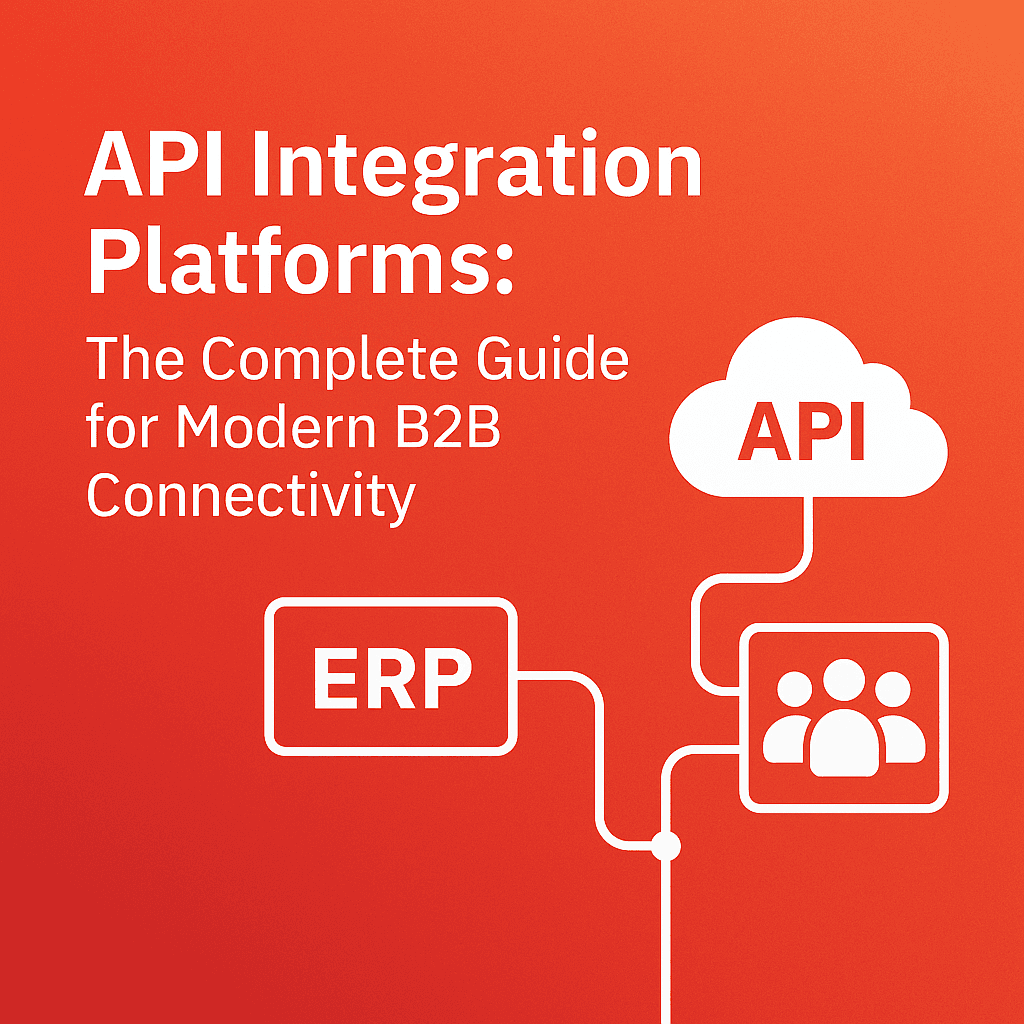Learn what API integration platforms do, why they matter for B2B supply chains, and how the Orderful platform offers a faster, cost-effective solution.
Businesses run on connections. Finance systems, supply chain platforms, logistics providers, and customer apps all need to exchange information quickly and reliably, and API integration platforms help take care of all that.
An API integration platform lets you connect applications, partners, and workflows without building custom code for every new connection. The right platform helps businesses automate processes, replacing manual work with scalable automation solutions.
This guide explores API integration platforms and why they matter for B2B connectivity. We’ll also show how modern, API-first solutions like Orderful give you a faster, simpler, and more cost-effective alternative to generic iPaaS tools.
What Is an API Integration Platform?
An API integration platform is a centralized solution for managing connections between different applications, B2B systems, and trading partners. Instead of building unique integrations for every tool or partner, these platforms integrate APIs through a single hub.
There's a clear distinction between the actual API and API platforms. An application programming interface (API) is a set of rules that dictates how two systems exchange data. This is common in B2B APIs, where businesses define their own rules for connecting and exchanging information.
For example, a company might connect Slack and Salesforce using an API to synchronize messages with customer records. An API integration platform takes that idea further by supporting multiple APIs, offering pre-built connectors, and enabling seamless connectivity across an entire supply chain.
Why Businesses Need an API Integration Platform
Modern businesses depend on multiple apps and data sources. Rapid adoption of SaaS, e-commerce, and cloud systems has created more endpoints than most IT teams can manage with human intervention alone. A unified platform connects multiple applications across diverse environments without requiring custom configuration or manual data entry that slows down operations.
An API integration platform centralizes connectivity and streamlines business processes. With a single place to bring APIs together, organizations can automate tasks and reduce time-consuming work.
For supply chain leaders, the benefits go even further. Real-time data flowing between ERP systems, logistics providers, and B2B partners keeps inventory levels accurate and tracks shipments as they move. In this way, API integration platforms become essential for transforming electronic data interchange (EDI) and partner connectivity.
B2B APIs and the Role of Integration Platforms
B2B APIs are designed for exchanging information directly between software systems. Instead of just connecting apps inside one company, these APIs enable the exchange of electronic documents such as purchase orders, invoices, and shipment statuses across business partners. They keep data flowing consistently between retailers, distributors, and logistics providers.
Every trading partner might have different requirements or file formats that they use. An API integration platform simplifies the ability to exchange information by standardizing communication. With pre-built connectors and security features, you can integrate faster and avoid the manual work of mapping every connection.
Unlike SaaS-focused integrations that only connect internal apps, these platforms support EDI-API integrations, which extend real-time data exchange across supply chains and partner networks. This makes it possible to scale B2B transactions without adding complexity or custom code.
Key Features of an API Integration Platform
A strong API integration platform should offer functionality that makes it easier to monitor and scale across different systems. These features stand out as crucial for business and supply chain leaders:
Unified API gateway: API integration platforms give you a single place to handle authentication, permissions, and traffic across multiple APIs. This simplifies integration and reduces the need for technical expertise.
Pre-built connectors: Ready-made connections for ERP systems and other business software save time and eliminate repetitive custom code.
Real-time monitoring and troubleshooting: Real-time visibility into transactions and error handling ensures smoother business processes and faster resolution when something goes wrong.
Scalability: Inability to connect to partners shouldn't hold you back. Platforms should be able to process thousands of transactions per day without performance issues, ensuring future-proof operations.
Security and compliance features: From data encryption to audit logs, strong security protects sensitive business data while meeting compliance requirements.
Ease of use: Intuitive interfaces make it possible to automate tasks and manage integrations without requiring deep technical knowledge.
With a single platform, you're able to integrate more efficiently, replace manual processes with automation, and maintain the flexibility to adapt to new technologies and customer needs.
Common Challenges with API Integration Platforms
Even with their benefits, API integration platforms can introduce challenges if they aren’t built with business needs in mind. Some of the most common issues include:
Security risks: Without strong security features, sensitive data shared across APIs can be vulnerable to breaches or unauthorized access.
Managing multiple endpoints: As businesses add more partners and applications, keeping track of dozens, or even hundreds, of APIs can become complex and time-consuming.
Legacy vendors cloud-washing solutions: Many providers implement a cloud connection, then rebrand older EDI or middleware tools as “cloud-based” without delivering the flexibility or usability of a true cloud API platform.
High total cost of ownership (TCO): Enterprise iPaaS tools such as MuleSoft, Boomi, or Cleo often come with complex licensing, custom development, and per-transaction fees. For the average enterprise, these costs drive up their TCO, making scalability cost-prohibitive.
It's clear that the right platform matters. Businesses need a scalable solution that avoids unnecessary complexity, eliminates manual work, and delivers price transparency without requiring heavy technical expertise.
How API Integration Platforms Support Supply Chain-ERP Workflows
API integration platforms bring core supply chain and ERP systems together, enabling businesses to coordinate processes that span multiple partners and platforms.
A few common use cases include:
Real-time inventory sync: Keeps stock levels updated across ERP systems, warehouses, and e-commerce platforms to prevent overselling or stockouts.
Shipment tracking: Gives logistics providers, retailers, and customers access to the same real-time data, improving visibility across the supply chain.
Order-to-cash automation: Links purchase orders, invoices, and payment systems to reduce delays and speed up cash flow.
Partner onboarding: Simplifies the process of connecting with new retailers, distributors, or third-party logistics (3PL) partners by using ready-made connectors instead of relying on custom development.
By standardizing these workflows, organizations have greater flexibility and an improved customer experience by modernizing their ERP systems.
Orderful vs. Generic API Integration Platforms
Generic iPaaS tools like MuleSoft, Boomi, and Cleo are designed for broad use cases, but they often create unnecessary complexity for B2B integrations. They typically require heavy IT involvement and custom configuration, which can extend onboarding timelines. Pricing models can become unpredictable, with volume-based or per-transaction fees that increase as your business grows.
Orderful takes a different approach. As an API-first, cloud-native solution built specifically for B2B and EDI, Orderful API integration delivers faster onboarding, predictable pricing, and seamless connectivity across trading partners. Instead of building each connection from scratch, you can connect once to the Orderful platform and gain access to established trading partner mappings. This digital transformation dramatically reduces setup time and eliminates the need for complicated workflows or technical expertise.
Key Differentiators:
Single API connection: Integrate once and immediately trade with any partner in the network.
Flat per-partner pricing: There are no per-document or volume-based fees.
Pre-built partner mappings: Orderful has connections already in place to major retailers, distributors, and 3PLs.
Fast onboarding: Most partners go live in fewer than nine days.
Real-time visibility: Includes dashboards, error handling, testing, and validation by default.
ERP integrations: Built-in support for NetSuite, SAP, Microsoft Dynamics, and more.
Here’s how Orderful compares to generic iPaaS platforms:
Feature / Platform | Orderful (API-First EDI Platform) | Generic iPaaS (Cleo, MuleSoft, Boomi) |
|---|---|---|
Architecture | Cloud-native, API-first, built for B2B/EDI | Broad iPaaS tools designed for app-to-app SaaS connections |
Onboarding Speed | <9 days to onboard new partners | Weeks to months (custom mapping, heavy IT lift) |
Trading Partner Connectivity | Prebuilt mappings for major retailers, 3PLs, distributors | Requires custom development and middleware |
Pricing Model | Flat per-partner pricing, no per-document fees | Volume-based or per-transaction fees → costs scale with usage |
Visibility & Monitoring | Real-time dashboards, error handling, transaction validation | Limited visibility; requires add-on monitoring tools |
ERP Integration | Native support for NetSuite, Acumatica, SAP, Dynamics, etc. | Often requires custom connectors or additional licensing |
Best For | Enterprises and SMBs needing modern B2B/EDI connectivity | Large IT teams managing multiple SaaS apps, less focused on B2B |
With API integration through Orderful, businesses get the simplicity of outsourcing without the lock-in, delays, or escalating costs. Orderful is a scalable solution built to keep supply chains moving and trading partners connected.
How to Choose the Right API Integration Platform
The best platform should simplify integrations, support your growth plans, and deliver a clear return on investment.
When evaluating options, focus on these criteria:
Onboarding speed: Platforms should connect new partners in days, not months.
Room to grow: Look for a scalable solution that can support thousands of transactions and multiple APIs without performance issues.
ERP and WMS integrations: Seamless connectivity with ERP systems, warehouse management systems, and supply chain partners ensures real-time data flows across your business.
TCO: Predictable costs are essential to avoid hidden fees that can make solutions unsustainable over time.
If you're modernizing your ERPs, prioritize an API-first integration platform that eliminates manual data entry and automates workflows. By focusing on these factors, you can turn APIs into a competitive advantage.
Unlock Business Value With the Right API Integration Platform
APIs are the backbone of modern connectivity. The right integration platform gives you the foundation to unify applications, scale with ease, and drive customer success.
Orderful stands apart. Built as an API-first, cloud-native platform for B2B and EDI, Orderful offers faster onboarding, flat pricing, and pre-built trading partner mappings so you can connect once and trade with confidence. If you’re ready to modernize your integrations, contact an EDI expert or book a demo today.
FAQs About API Integration Platforms
What is an API integration platform?
An API integration platform is software that connects applications, systems, and trading partners through APIs. It enables real-time data exchange without manual coding, allowing businesses to automate workflows and scale faster.
How do B2B APIs fit into an integration strategy?
B2B APIs enable businesses to exchange documents—like purchase orders, invoices, and shipping updates—directly between systems. They integrate supply chain, ERP, and logistics data to ensure accuracy and improve partner collaboration.
What’s the difference between an API platform and iPaaS?
An API platform focuses on real-time API connectivity and automation, while iPaaS tools (integration platform as a service) often rely on older, middleware-style data pipelines. API-first platforms are faster, more flexible, and cost-efficient for B2B integrations.
Can API integration platforms replace EDI?
Yes, in many cases. API integration platforms modernize traditional EDI by delivering real-time connectivity, automation, and visibility across partner networks—reducing manual setup and improving data accuracy.
Why is Orderful the best API integration platform for supply chains?
Orderful is purpose-built for B2B and EDI. Its API-first platform provides prebuilt partner mappings, real-time validation, and flat per-partner pricing. Businesses can onboard new trading partners in days instead of months, lowering costs and complexity.
- 01What Is an API Integration Platform?
- 02Why Businesses Need an API Integration Platform
- 03B2B APIs and the Role of Integration Platforms
- 04Key Features of an API Integration Platform
- 05Common Challenges with API Integration Platforms
- 06How API Integration Platforms Support Supply Chain-ERP Workflows
- 07Orderful vs. Generic API Integration Platforms
- 08How to Choose the Right API Integration Platform
- 09Unlock Business Value With the Right API Integration Platform
- 10FAQs About API Integration Platforms

